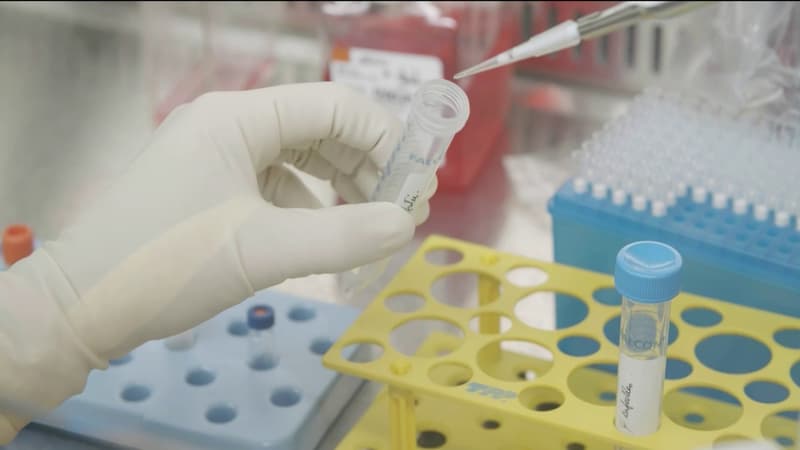“These are crazy times when it comes to cancer treatment.” Professor David Khayat, oncologist, founder of the National Cancer Institute, did not hide his optimism about advances in cancer research on BFMTV this Sunday, while the annual meeting of Asco (American Society of Clinical Oncology) was held, a point of key meeting for researchers and oncologists. of all the world.
He reacted in particular to the conclusive results of therapeutic trials by the French laboratory Transgene, which has designed a vaccine to prevent the recurrence of cancers affecting the ENT (otorhinolaryngeal) sphere. Of the 16 patients treated with a personalized serum, none relapsed more than 10 months after injection.
“Until then, we attacked the tumor directly. From now on, we will awaken the patient’s immune system to fight it. This is very important news,” Iris Pauporté, director of research and innovation at the League Against Cancer Center, told BFMTV.com.
“It is still very experimental”, however, David Khayat recalled and stressed that the developed vaccine refers to specific types of cancer and only to the prevention of relapses.
Lung and pancreatic cancers in the face of progress
This is not the only vaccine in development. In May, the German laboratory BioNTech presented in the magazine Nature the results of a messenger RNA vaccine, of the same model as those against Covid-19, to combat pancreatic cancer, which kills 88% of affected patients. Among the 16 patients studied, half developed cells capable of destroying cancer.
“In this specific case, we are at the beginning of a story. This is good news, a source of hope,” Éric Solary, president of the scientific council of the ARC foundation for cancer research, reacted to BFMTV.com.
In another cause for hope, results from a clinical trial against the deadliest cancer caused a stir this weekend in Chicago: One tablet, given daily (sometimes in addition to chemotherapy) in operable lung cancers, halved mortality with five years of follow-up.
The survival data is “impressive,” boasted Roy Herbst of Yale University. “In these types of diseases, whose progress is slow, a great ray of hope is lit,” said Iris Pauporté.
Fruits of decades of research
The researcher from the League Against Cancer explained the “acceleration of innovation” in recent years by in-depth work begun “a good fifteen years ago.” “We established cancer genomics research by making an accurate catalog of tumors. It was a crazy bet, but thanks to that, we generated a lot of knowledge.”
She is accompanied by Éric Solary, author of the preface to “Revolutions in cancer research”, published in April by the ARC: “We are in a phase of acceleration of the implementation of the discoveries of these twenty years. We already know the drugs better and they are able to use them in the early stages. This is a big step forward.”
“Every two, three years, a new way of treating cancer emerges,” Professor Khayat also rejoiced, referring in particular to immunotherapy, targeted therapy and “hopes for vaccines.”
According to 2022 figures from the National Cancer Institute, 6 out of 10 patients are cured of cancer today, compared to 5 out of 10 in the 2010s and 3 out of 10 at the end of the 20th century. This rate tends to increase even more in the coming years, although the aging of the population and better healing -and therefore the greater risk of contracting several cancers throughout life- should be the cause of a greater number of cancers. .
“There are good reasons to be optimistic. The goal is to reach 3 out of 4 patients cured as soon as possible”, hopes Éric Solary.
The difficulty of generalizing treatments
This progress, as encouraging as it is, will now face several obstacles. The first: advances often refer to specific cases of tumors and cannot yet be generalized to all patients with a form of cancer.
For example, regarding AstraZeneca’s drug against lung cancer, Iris Pauporté highlighted that it only affected 10% of cases, or 1,500 patients in France. Next, the director of research and innovation of the League Against Cancer put her finger on the price of this type of treatment, specifically in the case of the vaccine against ENT cancers personalized for each patient thanks to artificial intelligence.
“The economic model is not stabilized. What will it cost to test 15,000 patients per year?” she wondered. “We are also aware of the difficulty of access to medicines for all patients.”
According to Éric Solary, “the cost will be a source of political and social conflict.” Although nursing staff have warned about the state of the French health system for many years, particularly the lack of resources invested in hospitals, the professor of hematology at the Paris-Saclay Faculty of Medicine noted “a contrast between progress of knowledge and the difficulties of the daily functioning of a hospital”.
“You have to preserve the health system to benefit from the advances in research, he said, the question is on the table.”
Source: BFM TV


